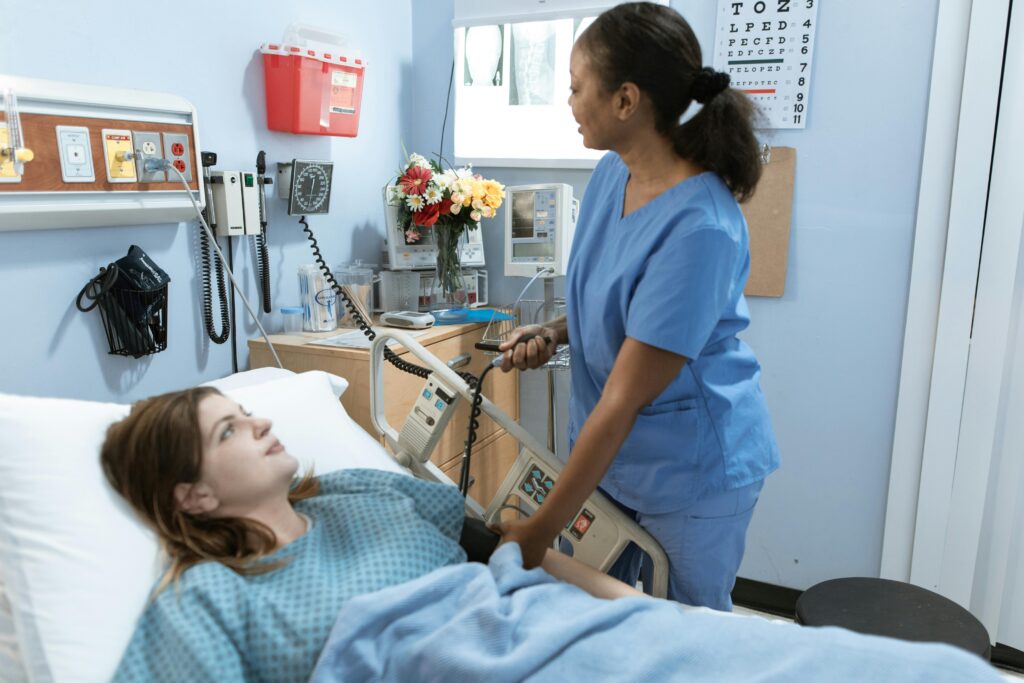
If you’ve ever wondered, “What is a telemetry nurse?”, you’re not alone. Telemetry nurses play a critical role in modern healthcare, combining advanced monitoring technology with expert patient care. These specialized nurses work with patients requiring continuous observation, using telemetry systems to track vital signs and detect potential issues before they become emergencies.
In this guide, we’ll explore what telemetry nurses do, how telemetry works in nursing, and why this field offers a rewarding and dynamic career path.
What is a Telemetry Nurse?
A telemetry nurse specializes in caring for patients who need constant monitoring of their vital signs due to medical conditions like heart disease, respiratory issues, or after surgery. These nurses work with telemetry systems—advanced devices that remotely track and transmit data like heart rate, blood pressure, and oxygen levels to healthcare professionals.
Key Responsibilities:
- Monitoring Patients: Using telemetry equipment to observe patients’ vital signs in real-time and identify irregularities.
- Administering Treatments: Providing medications, adjusting oxygen levels, and managing IV lines based on patient needs.
- Interpreting Data: Analyzing telemetry readings and escalating concerns to physicians or specialists when necessary.
- Patient Education: Teaching patients and their families how to manage chronic conditions or recover after hospitalization.
- Collaborating with the Healthcare Team: Working alongside doctors, cardiologists, and other nurses to deliver comprehensive care.
How Does Telemetry Work in Nursing?
Telemetry in nursing involves using portable devices that record and transmit patients’ vital signs to centralized monitoring systems. Here’s a closer look at how it works:
- Equipment Setup: Patients wear electrodes connected to telemetry monitors, which transmit data wirelessly to a monitoring station.
- Continuous Monitoring: Telemetry nurses watch for irregularities like arrhythmias, changes in oxygen levels, or fluctuations in blood pressure.
- Data Analysis: Nurses analyze the data in real-time and use it to make informed decisions about patient care.
- Emergency Response: If the system detects a critical change, telemetry nurses act quickly to stabilize the patient or alert the healthcare team.
Telemetry for Nurses: Skills and Traits Required
Telemetry nursing requires a blend of technical expertise and interpersonal skills. Here are the key qualities needed:
1. Attention to Detail
- Telemetry nurses must closely monitor data and recognize subtle changes that may indicate serious conditions.
2. Strong Analytical Skills
- The ability to interpret telemetry readings and make quick, informed decisions is essential.
3. Compassion and Patience
- Providing emotional support to patients, many of whom may be anxious about their health, is a vital part of the role.
4. Technical Proficiency
- Nurses must be comfortable using telemetry systems and understanding how they integrate into patient care.
5. Effective Communication
- Clear communication with patients, families, and healthcare teams ensures everyone is aligned on treatment goals.
Telemetry Nurse Job Settings
Telemetry nurses work in various healthcare environments, including:
- Hospitals: In telemetry units, cardiac care floors, or step-down units for patients transitioning out of intensive care.
- Rehabilitation Centers: Monitoring patients recovering from strokes, surgeries, or heart attacks.
- Long-Term Care Facilities: Providing care for patients with chronic conditions requiring ongoing monitoring.
How to Become a Telemetry Nurse
If you’re inspired to pursue this specialized role, here’s how to get started:
1. Earn a Nursing Degree
- Complete an accredited program such as an Associate Degree in Nursing (ADN) or a Bachelor of Science in Nursing (BSN).
2. Obtain Licensure
- Pass the NCLEX-RN exam to become a licensed registered nurse.
3. Gain Experience
- Many telemetry nurses start in medical-surgical units or general nursing roles to build a strong foundation.
4. Pursue Certifications
- Consider certifications like the Progressive Care Certified Nurse (PCCN) or Advanced Cardiac Life Support (ACLS) to demonstrate expertise in telemetry.
5. Seek Specialized Training
- Some facilities offer on-the-job telemetry training for nurses transitioning into this field.
Why Telemetry Nursing is a Rewarding Career
Telemetry nurses are at the forefront of patient care, combining cutting-edge technology with compassionate nursing. Here’s why it’s a fulfilling career choice:
- High Demand: With increasing rates of chronic conditions like heart disease, telemetry nurses are in high demand.
- Career Growth: This specialty provides opportunities to advance into roles like critical care nursing or nurse management.
- Making a Difference: Telemetry nurses play a crucial role in early detection and intervention, saving lives daily.
Is Telemetry Nursing Right for You?
So, what is a telemetry nurse? It’s a specialized caregiver who uses advanced technology to monitor patients’ health and respond swiftly to changes. If you’re detail-oriented, enjoy working with technology, and want to make a meaningful impact, telemetry nursing could be the perfect fit.
Whether you’re considering telemetry nursing as a new specialty or exploring how telemetry for nurses enhances patient care, this role offers endless opportunities to grow, learn, and make a difference.
